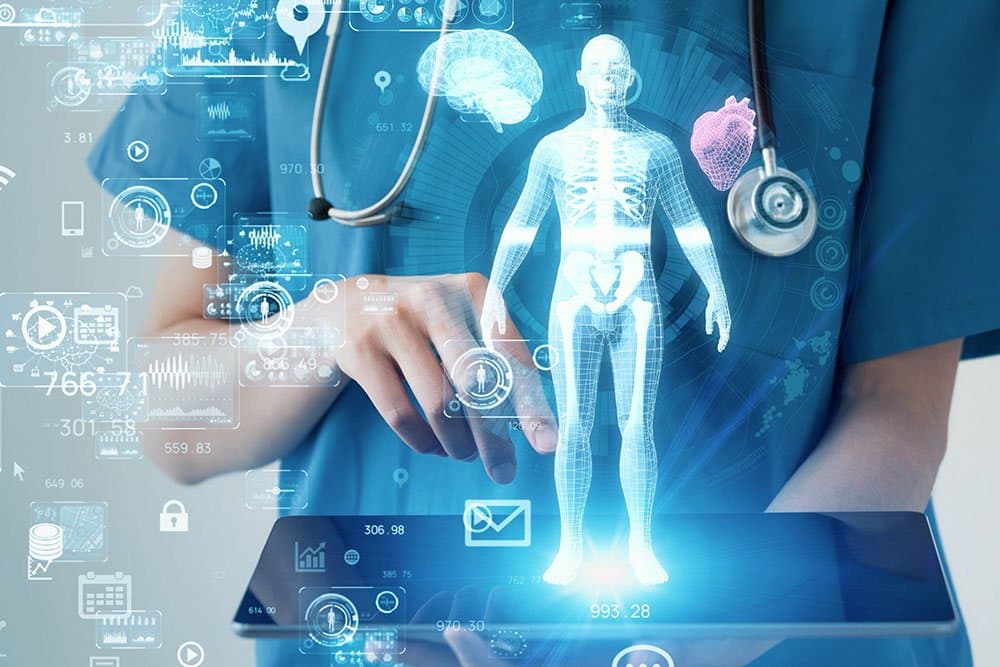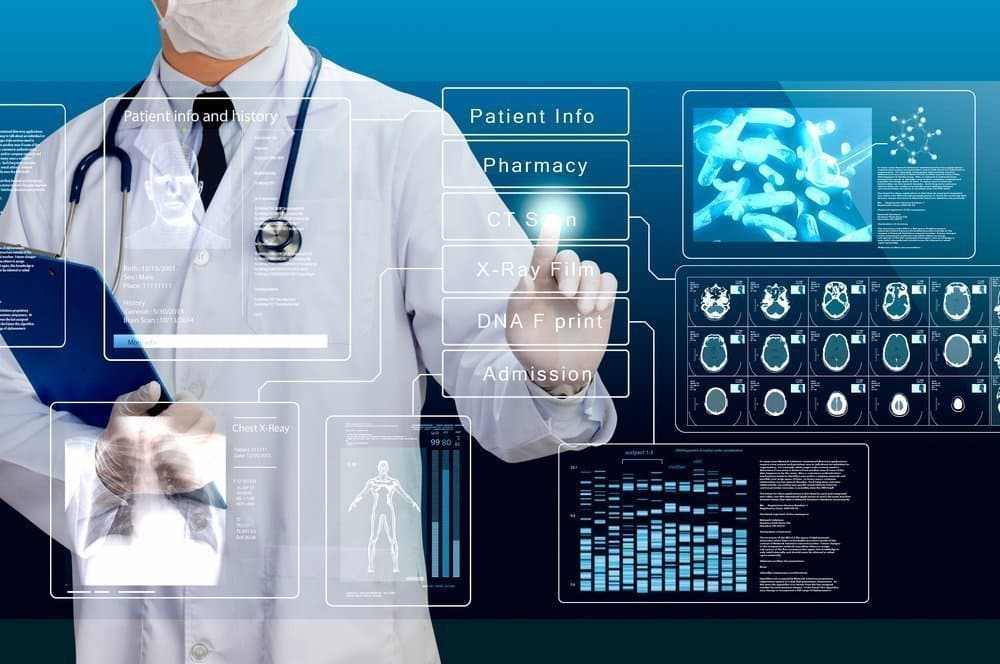
How Artificial Intelligence is Helping in Disease Diagnosis?
Artificial Intelligence (AI) is progressively cementing its role as an indispensable cornerstone within the healthcare sector, providing clinicians with cutting-edge instruments that facilitate unparalleled diagnostic precision and the early identification of pathologies. Through the sophisticated analysis of immense data sets, AI uncovers latent patterns and correlations, not only expediting the diagnostic process but also significantly augmenting its accuracy. As technological advancements unfold, AI paves the way for novel therapeutic modalities and preventative strategies. In this discourse, we delve into the myriad ways in which AI bolsters healthcare practitioners in their routine practices, while also scrutinizing the vast, untapped potential this transformative technology promises for the future trajectory of medical science.
What is artificial intelligence in medicine?
In the realm of medicine, artificial intelligence (AI) signifies the deployment of sophisticated algorithms and machine learning techniques to meticulously analyze medical data, deliver diagnostic insights, and project the trajectory of various diseases. Through the systematic evaluation of expansive datasets—ranging from diagnostic images and laboratory test outcomes to comprehensive patient histories—AI is capable of rendering highly accurate and expeditious assessments, thereby optimizing clinical decision-making and enhancing predictive capabilities.
AI and online gaming: unexpected intersections
Interestingly, artificial intelligence is already being used extensively in other areas, such as online casinos. Some platforms, such as BC Game Casino, have started utilizing advanced AI technology to improve user experience and increase game transparency. In particular, users are offered BC Game Casino no deposit bonus, which allows players to try their hand without the risk of loss. This is a great example of how AI technology can change various industries, creating new opportunities for users and providing them with more convenience and reliability.
How is AI improving diagnostics?
Annually, artificial intelligence (AI) becomes increasingly ingrained within the fabric of medical practice, assuming a pivotal role in diagnostic processes. Harnessing its formidable computational capacity and sophisticated machine learning algorithms, AI substantially elevates the accuracy and efficiency of diagnostic procedures. This synergy not only accelerates the detection timeline but also refines the precision of diagnoses. In this context, it is essential to examine the transformative impact of these technologies on the realm of disease detection and diagnosis.
- Accelerating diagnosis
Advanced AI systems can now analyze medical images—X-rays, MRIs, and CT scans—at unprecedented speeds, providing results in minutes, compared to the days or weeks required by traditional methods.
- Improved diagnostic accuracy
AI algorithms, trained on extensive datasets, can detect patterns often missed by humans. This ability is especially vital in complex cases, such as cancer diagnosis, where early detection significantly boosts the chances of successful treatment.
- Detecting rare diseases
Artificial intelligence is aiding physicians in diagnosing rare and elusive conditions by processing complex data beyond human analytical capacity. This empowers AI to offer valuable insights and recommendations, assisting doctors in confirming their diagnoses.
- Patient monitoring
With AI, patients can be continuously monitored in real time. This is particularly useful for patients with chronic conditions such as diabetes or cardiovascular disease. AI systems analyze data collected from wearable devices (e.g., fitness bracelets) and help doctors adjust treatment in a timely manner.
Application of AI in various fields of diagnostics
Contemporary AI technologies are being increasingly integrated into various medical disciplines, greatly enhancing the diagnostic process. Let’s explore how artificial intelligence specifically aids in disease diagnosis across different areas of healthcare.
- Oncology-focused AI is increasingly employed to analyze medical images for cancer detection. Systems trained on vast datasets of X-rays and MRIs can identify tumors at their earliest stages, when intervention is most impactful. Moreover, sophisticated AI models can forecast the probability of metastasis and suggest the most effective treatment approaches.
- Cardiology In cardiology, AI helps analyze ECG and cardiac activity data. This makes it possible to detect conditions such as arrhythmia, heart attack or heart failure before clinical symptoms appear. AI algorithms can predict the risk of heart attacks by analyzing even minimal variations in heart rhythm data.
- AI in neuroscience is instrumental in diagnosing neurological disorders such as Alzheimer’s disease, strokes, and other central nervous system ailments. By analyzing neuroimaging data, AI systems can detect even the most minute abnormalities. Furthermore, these technologies are essential for monitoring disease progression, allowing physicians to refine treatment strategies at early stages.
- Artificial intelligence is also harnessed to analyze genetic data, supporting the diagnosis of hereditary diseases and predicting the risk of developing specific conditions based on genetic predispositions. AI’s capacity to process vast volumes of mutation and genomic information enhances diagnostic accuracy and enables the formulation of personalized treatment plans.

Advantages and challenges of using AI in diagnostics
Advantages
- Increased access to care: AI can provide high-quality diagnostic services in remote areas where specialists are scarce.
- Reducing physician error: AI can help avoid human error and minimize the likelihood of misdiagnosis.
- Cost reduction: Rapid and accurate disease detection helps reduce treatment costs and hospitalization time.
Challenges
- Ethical issues: The use of AI in medicine raises questions about the protection of personal data and the possible consequences of automated decision-making without human input.
- Need for specialist training: Physicians must be trained to use AI tools effectively, which requires time and resources.
- Reliability of technology: Despite advances, AI cannot always guarantee 100% accuracy. In some cases, human intervention is required to definitively confirm the diagnosis.
Prospects and future of AI in medicine
The potential for artificial intelligence in medicine is vast, and its impact is set to grow in the coming years. AI is anticipated to not only greatly enhance diagnostic processes but also revolutionize treatment approaches, making them more tailored and precise.
The introduction of AI into medical practice will enable the development of individualized treatment plans that take into account the genetic characteristics and unique needs of each patient. This will enable better management of chronic diseases and adaptation of therapy based on changes in the patient’s condition.
Of particular importance will be the use of data from wearable devices, such as fitness trackers or smartwatches, which will help doctors monitor patients in real time. This will make it possible to detect abnormalities in time and prevent the development of diseases at early stages, such as cancer, diabetes or cardiovascular disorders.
Moreover, AI will play a pivotal role in disease prediction and prevention by analyzing extensive medical datasets and uncovering concealed patterns. The integration of these technologies will empower physicians to make faster diagnoses and devise more effective preventive strategies, ultimately lowering mortality rates and improving patients’ long-term quality of life.